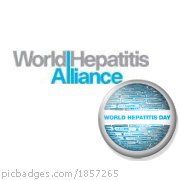 World Hepatitis Day is Thursday, July 28th! Join the World Hepatitis Alliance. The theme is “This is Hepatitis”, which is aimed at raising global awareness. Globally, two billion people have been infected with hepatitis B, (one out of three), and 400 million live with a chronic, lifelong infection. Although there are excellent treatments available, there is no cure for hepatitis B. However, there is a safe and effective HBV vaccine. If you are infected, be sure loved ones and household contacts are screened and vaccinated. If you are not infected or not vaccinated, get vaccinated and help eliminate the spread of this virus, worldwide.
World Hepatitis Day is Thursday, July 28th! Join the World Hepatitis Alliance. The theme is “This is Hepatitis”, which is aimed at raising global awareness. Globally, two billion people have been infected with hepatitis B, (one out of three), and 400 million live with a chronic, lifelong infection. Although there are excellent treatments available, there is no cure for hepatitis B. However, there is a safe and effective HBV vaccine. If you are infected, be sure loved ones and household contacts are screened and vaccinated. If you are not infected or not vaccinated, get vaccinated and help eliminate the spread of this virus, worldwide.
Show your support by adding a World Hepatitis Day PicBadge to your facebook and twitter profile pictures. This makes a great visual statement. You can also add the widget to your website or blog. Take a look at HBF’s website, and note the slider at the top with “World Hepatitis Day”. Check out the details on how to add the World Hepatitis Day PicBadge to your profiles and website. Select the “add to profile picture” button. Follow the instructions and the badge will be added to your FB and/or twitter profile pics. (FYI.. I use hootsuite to manage my tweets, and it wasn’t initially obvious that it picked it up, but it worked fine. ) Check out HBFs FB and twitter profile pics to get an idea of how it looks. Once you make the modifications, the PicBadge program will post the badge to your wall and tweet an invite to others to join with their support. You can also have picbadge send a request to FB friends so they may lend their support.
On a personal note, consider sharing your story on the World Hepatitis Alliance’s “Wall of Stories” Please feel free to share your story in your native language. The more personal the stories, the better!
Be sure to let us know what you or your organization is up to for World Hepatitis Day! No contribution is too small in the fight against viral hepatitis!











 The Hepatitis B Foundation
The Hepatitis B Foundation 


